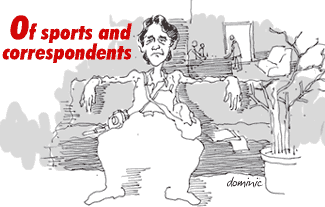
|
HOME |
NEWS |
REDIFF DIARY
|
Faisal Shariff |
|
When they eagerly question me about my profession, I can't resist a wry smile. The reality is far different from the fantasies I had entertained when I joined the club of correspondents. I had thought it was all about being on buddy-buddy terms with the cricketers, phoning them up or, alternatively, wandering into their dressing rooms when you needed an update... It is not like that at all. Not one bit. The reality of a being a sports correspondent, I would say, is sitting around in hotel lobbies for endless hours, feeling increasingly conspicuous and progressively embarrassed, waiting for the cricketer of the day. The reality is trying to pass the time by counting the number of bulbs in hotel chandeliers. It is the sinking feeling that you get at the end of a long vigil, when you realise that it is time to call it a night and you have nothing to show for all the hours wasted. Take, for instance, the time I tried to interview Sourav Ganguly when he took over the reins of the Indian team. It was in Bangalore, during the second Test of the India-South Africa series. On day two, I managed to get in touch with him over the house telephone of the hotel where the team was put up. "Let's speak this evening at five," he told me. 'This evening' became the next, and the next. And finally, the last day of the Test dawned. And ended, with India ignominiously surrendering its cachet of never having lost a home Test series in 13 years. I went back to the hotel after the match. By then I was knew the layout of the place better than the hotel staff themselves. I hung around for three hours in the corridor outside Ganguly's room, waiting, whiling away part of the time watching Sachin Tendulkar do a photo-shoot. Finally, Ganguly came out. By then it was time for the team to leave for the airport. So I was hustled into the team bus, and the captain-elect shared a few moments, a few words, with me. When I signed up for this job, my editor had told me that journalism is not about how well I can write, but about patience and perseverance. After a year in the profession I suspect that he was understating the case. It is not just Ganguly, mind you -- Azhar, Cronje, Kirsten, these and many others have made me at times reconsider my career option. The other day I went to Karad, near Satara. I was there to speak to the family members of Khashabha Jadhav, bronze medallist at the 1952 Helsinki Olympics, and India's first individual medallist of any hue (in all of our history, there have only been two, the other being Leander Paes in 1996). My colleagues keep saying that I have the luck of the devil himself, and I am beginning to believe that. I landed there on the day the little village was celebrating Jadhav's 16th death anniversary. Photographer Jewella C Miranda and I, we walked in and mentioned Jadhav's name -- and that was it! Before we knew what was happening, we were being fussed over and treated like royalty. At the function the villagers had that evening to honour their most famous son (they do this every year), we were installed on the dais as chief guests, garlanded, made the subject of laudatory speeches... It was embarrassing, sitting there, the cynosure of the entire village. It was also very, very touching. Time and again, people came up to the two of us and asked, "You have actually come all the way from Bombay only for Kashaba dada?" I realised then that this is where India's sporting spirit really lies. In these little villages that honour their champions long after their names have faded from public memory, long after their records have been broken, long after they are dead and gone. Khashbha Jadhav is a name not familiar to most of you. Yet to that village, he was a source of pride, an inspiration, an icon, an example for successive generations to grow up on. In that village, thanks to the deeds of a man long since dead, the Olympic flame burns bright. Later that evening I got to hold the bronze medal Jadhav won at Helsinki so long ago. It made me feel both exalted and humbled. As I walked away from there, I thought, do any of us remember how many Pepsi Cups the Indian cricketers have won or lost? Do we care? I know one thing for sure. Nothing can give me the same sense of awe as I felt when I held that Olympic medal in my hand. To win a cricket cup, you have to be merely one in a team. To win an Olympic individual medal, you have to be a man in several billion. God must have directed my steps to that village that day. For that chance encounter with a sporting legend helped wipe away the angst of a year of chasing our pampered darlings of cricket. More importantly, it kindled afresh the love for sport that was ebbing within me under the constant onslaught of CBI inquiries and IT raids and stories of the many millions our players have made, legally and otherwise.
Faisal Shariff is a good sport.
|
||
|
HOME |
NEWS |
CRICKET |
MONEY |
SPORTS |
MOVIES |
CHAT |
BROADBAND |
TRAVEL ASTROLOGY | NEWSLINKS | BOOK SHOP | MUSIC SHOP | GIFT SHOP | HOTEL BOOKINGS AIR/RAIL | WEDDING | ROMANCE | WEATHER | WOMEN | E-CARDS | EDUCATION HOMEPAGES | FREE MESSENGER | FREE EMAIL | CONTESTS | FEEDBACK |
||
